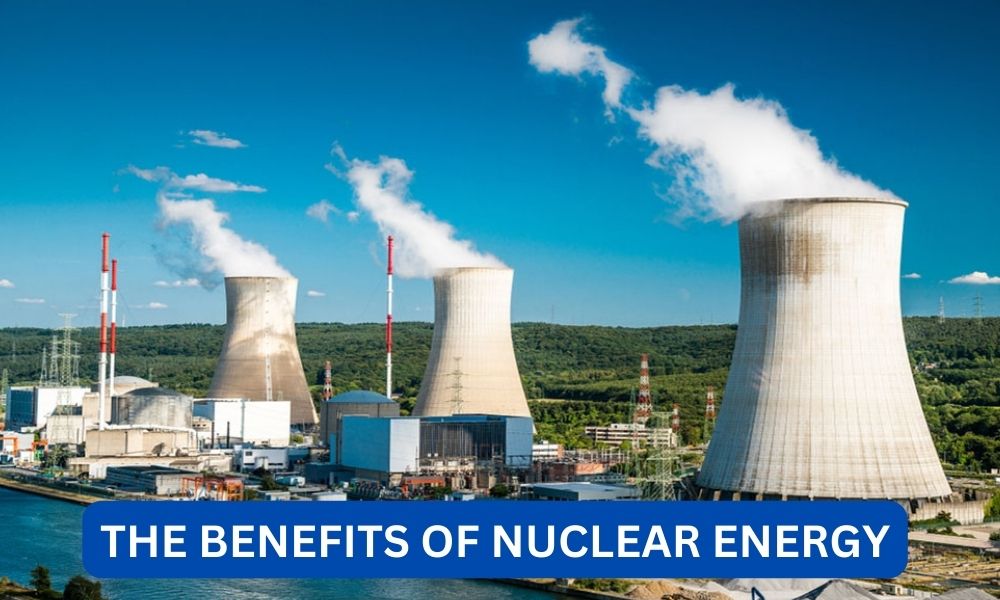Nuclear energy has been a topic of debate for decades, with strong opinions on both sides. While some argue that it is a dangerous and unsustainable source of energy, others believe that it is a crucial part of our energy mix. However, the truth is that nuclear energy has numerous benefits that are often overlooked. In this article, we will explore the benefits of nuclear energy and why it should be considered as a viable option for meeting our energy needs.
Contents
What is Nuclear Energy?
Nuclear energy is the energy released from the nucleus of an atom through a process called nuclear fission. This process involves splitting the nucleus of an atom, which releases a tremendous amount of energy. This energy can then be harnessed to generate electricity, making nuclear energy a form of electricity generation.
Nuclear energy is primarily produced in nuclear power plants, which use nuclear reactors to initiate and control the process of nuclear fission. These reactors use uranium, a naturally occurring element, as fuel. When the uranium atoms split, they release heat, which is used to produce steam. The steam then turns turbines, which generate electricity.
The Benefits of Nuclear Energy
Despite the negative perception surrounding nuclear energy, it has several benefits that make it a valuable source of energy. Let’s take a closer look at some of these benefits.
Read:What does forwarded to a third party agent mean?1. Low Carbon Emissions
One of the most significant benefits of nuclear energy is its low carbon emissions. Unlike fossil fuels, which release large amounts of carbon dioxide and other greenhouse gases into the atmosphere, nuclear energy does not emit any carbon dioxide. This makes it a crucial tool in the fight against climate change.
In fact, according to the International Atomic Energy Agency (IAEA), nuclear energy is responsible for preventing the emission of over 2.5 billion tonnes of carbon dioxide each year. This is equivalent to taking more than 500 million cars off the road.
2. Reliability and Stability
Nuclear energy is a reliable and stable source of energy. Unlike renewable energy sources such as wind and solar, which are dependent on weather conditions, nuclear power plants can operate 24/7, providing a constant and consistent supply of electricity.
This reliability is crucial for meeting the energy demands of a growing population. As the world’s population continues to increase, so does the demand for energy. Nuclear energy can help meet this demand without relying on unpredictable weather patterns.
3. High Energy Density
Nuclear energy has a high energy density, meaning that a small amount of fuel can produce a significant amount of energy. For example, one kilogram of uranium can produce the same amount of energy as 100,000 kilograms of coal. This makes nuclear energy a highly efficient source of energy.
Read:What are two benefits associated with reverse logistics?Moreover, nuclear power plants require less land compared to other forms of energy generation, such as wind and solar farms. This is because nuclear reactors can produce a large amount of energy in a relatively small space. This makes nuclear energy a viable option for countries with limited land resources.
4. Cost-Effective
While the initial cost of building a nuclear power plant may be high, the cost of producing electricity from nuclear energy is relatively low. According to the Nuclear Energy Institute, the average cost of producing electricity from nuclear energy in the United States is around 2.14 cents per kilowatt-hour. This is lower than the cost of producing electricity from coal, natural gas, and even some renewable sources.
Moreover, nuclear power plants have a lifespan of around 60 years, making them a long-term investment. This stability in cost makes nuclear energy an attractive option for countries looking to diversify their energy mix and reduce their reliance on fossil fuels.
5. Job Creation
Nuclear energy also has a significant impact on job creation. According to the World Nuclear Association, the nuclear industry employs over 2.6 million people worldwide. This includes jobs in construction, operation, maintenance, and fuel production.
Read:Germany Revives Coal Plants to Avert Winter Power ShortagesMoreover, the construction of a nuclear power plant can create thousands of jobs in the local community. For example, the construction of the Hinkley Point C nuclear power plant in the UK is expected to create around 25,000 jobs during its construction phase.
Case Study: France’s Dependence on Nuclear Energy
France is a prime example of the benefits of nuclear energy. The country relies heavily on nuclear energy, with over 70% of its electricity coming from nuclear power plants. This has allowed France to significantly reduce its carbon emissions, making it one of the cleanest countries in terms of energy production.
Moreover, France’s reliance on nuclear energy has also made it less vulnerable to fluctuations in fossil fuel prices. This has helped the country maintain a stable and affordable electricity supply for its citizens.
Furthermore, the nuclear industry in France has created thousands of jobs and has contributed significantly to the country’s economy. According to the World Nuclear Association, the nuclear industry in France generates around €50 billion in revenue each year and employs over 220,000 people.
The Challenges of Nuclear Energy
While nuclear energy has numerous benefits, it also comes with its own set of challenges. These challenges include safety concerns, waste management, and the potential for nuclear weapons proliferation.
Safety Concerns
The safety of nuclear power plants is a significant concern for many people. The potential for accidents, such as the Chernobyl and Fukushima disasters, has raised questions about the safety of nuclear energy. However, it is essential to note that these accidents were caused by human error and not by the technology itself.
Moreover, nuclear power plants have strict safety regulations and protocols in place to prevent accidents from occurring. The International Atomic Energy Agency (IAEA) sets these regulations and regularly conducts safety inspections to ensure that nuclear power plants are operating safely.
Waste Management
Nuclear waste is another challenge associated with nuclear energy. Nuclear waste is highly radioactive and can remain hazardous for thousands of years. Therefore, it is crucial to have proper waste management systems in place to ensure the safe disposal of nuclear waste.
Fortunately, the nuclear industry has developed advanced waste management techniques, such as deep geological disposal, to safely store and dispose of nuclear waste. These techniques have been proven to be safe and effective in countries such as Finland and Sweden.
Nuclear Weapons Proliferation
Another concern surrounding nuclear energy is the potential for nuclear weapons proliferation. The same technology used to produce electricity can also be used to produce nuclear weapons. Therefore, it is crucial to have strict regulations and international cooperation to prevent the misuse of nuclear technology.
The International Atomic Energy Agency (IAEA) plays a crucial role in monitoring and regulating the use of nuclear technology to prevent the spread of nuclear weapons. Additionally, countries that have signed the Treaty on the Non-Proliferation of Nuclear Weapons (NPT) have committed to using nuclear technology for peaceful purposes only.
Conclusion:
Nuclear energy has numerous benefits that make it a valuable source of energy. It is a low-carbon, reliable, and cost-effective source of energy that can help meet the growing demand for electricity. Moreover, it has the potential to create jobs and boost the economy.
While there are challenges associated with nuclear energy, such as safety concerns and waste management, these can be addressed through strict regulations and advanced technology. Therefore, it is essential to consider nuclear energy as a viable option for meeting our energy needs and reducing our reliance on fossil fuels.
As we continue to search for sustainable and clean sources of energy, nuclear energy should not be overlooked. It has the potential to play a significant role in our energy mix and help us achieve a more sustainable future.








